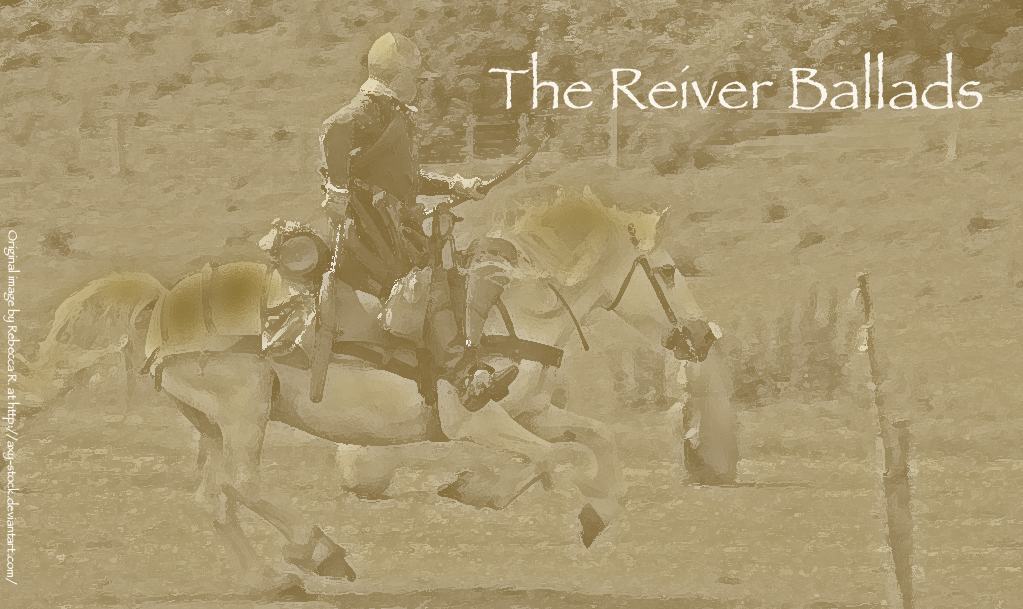Hughie the Graeme
Sir Walter Scott first included “Hughie the Graeme in the 1803 edition, the second edition of the Minstrelsy of the Scottish Border. It appears in the third volume. While Scott noted that his version in the 1803 version was from William Laidlaw of Blackhouse, he also refers to the version Joseph Ritson published in his Ancient Songs, and makes notations in the text where there are different readings between the versions. Ritson's version was collated from two blackletter ballads, one of which was in the collection of the Duke of Roxburgh. This certainly helps to indicate the relative age of the ballad tale, although there are two extant printed ballads in the Roxburghe Collection, The Life and Death of Sir Hugh-in-the-Grime and The Life and Death of Sir Hugh the Grime.
“Hughie the Graeme” relates a tale of betrayal and execution, and can be placed on the English side of the Border. The Grahams were predominantly an English family on the Borders, with extensive settlements in the Middle and West Marches.
History
There are no precise events which can be related to this ballad, neither does there seem to be a historical individual with the name Hugh Graham. While there are many Grahams listed in breviats of complaints, letters and missives from the Border, “Hugh” does not appear as a first name: the Grahams seem to have favoured Richard (Ritchie or Richey), George (and its variant) Geordie, and William. However, there are several Hutcheon Grahams mentioned, and Hutcheon can be a variant of Hugh. Perhaps the most notable Hutcheon Graham would be the father of William Armstrong of Kinmont's wife.
The Grahams, as an entire family, were feared and hated by numerous Border officials, but Thomas Scrope, perhaps above all, vented his hatred of them in ink. After the rescue of Kinmont Willie, Scrope seems to have excercised some kind of vendetta against the Grahams, considering them some of the prime movers in the entire affair. His letters regarding the Grahams are numerous and many go into detail about dreadful deeds, and throughout them all, the frustration of Scrope looms large.
On April 14th, 1596, the day after Kinmont's rescue, he wrote that no “officer here can purpose anything ever so secretly against an evildoer of England or Scotland, but the Grames hear ofand prevent it” (CBP II: 123). Later on in the year, in July, Scrope wrote to the Privy Council, complaining about the “awfulnes of the Grames” (CBP II: 159). On 22 December 1597, Scrope wrote to Cecil, complaining about the Grahams and his one-time employee Thomas Carleton, noting that “I know not any notable offendar, thiefe, or other, in that place, eyther Scottishe or Englisheman that eyther by alliance partie or complott, is not conjoyned with this viperouse generation.” (CBP II: 486).
These, then, were the Border Grahams, and Hughie Graham stands as a fine representative of that family. When James VI finally broke the Border and brought the inhabitants under control, the Grahams suffered more than many. Many were executed, and others were transported to Ireland and the Continent, with the assurance of death if they returned.
The Characters
There is only one main character in the ballad, which has a parallel with an historical individual.
Lord Scroope
This may refer to Henry, Lord Scrope, who was the English March Warden from 15 – 1593. His son inherited his Wardenshp, although his deputy, Richard Lowther was acting Warden until the official details were finalised. Thomas Scrope was English West March Warden from 1593-1603. He was a prolific writer, recording many of the complaints against the Scottish reivers. He enjoyed a relentless animosity of Buccleuch. He was frequently in despair of the English Grahams. He operated out of Carlisle. He had one brother recorded in documentation, called Henry.
